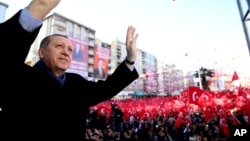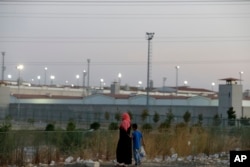Protesters chant, “We want the death penalty|," as 40 soldiers are led into an Ankara court. The soldiers are accused of trying to assassinate President Recep Tayyip Erdogan during a failed coup in July, in which more than 250 people were killed.
Erdogan, touring the country to rally support for an April referendum to extend his presidential powers, promised to bring back the death penalty. "If parliament passes the law to bring it back, I will sign it, and pay my debt to the martyrs of our country," Erdogan said to thousands of supporters in the Turkish city of Kahramanmaras Friday.
The death penalty was abolished by Erdogan when he was prime minister in 2004 as part of the country’s bid to join the European Union; but its return would be popular among many nationalists and conservative voters who support him.
With anger still felt toward those behind the coup attempt and a resurgence in terror attacks by Kurdish insurgents, analysts predict returning the death penalty is a vote winner. “There is a great yearning by the people to hang 'the bastards;' I really think people feel that way,” says political consultant Atilla Yesilada of Global Source partners; but Yesilada says Turkey will pay a high price. “If it is ever introduced, the EU has no choice but to cut the umbilical link to Turkey.”
EU warning
The European Union has warned Ankara its bid to join would be automatically frozen, but, with that bid making little progress because of opposition from some members, there is growing resentment among many Turks toward the European Union.
Erdogan said he is not going to listen to Europeans, referring to them as "Hans and George." At the Kahramanmaras rally, Erdogan told his supporters, “I listen to the Ayses and Ahmets of our country," referring to traditional Turkish Muslim names, while adding, "I listen to the words of God."
Analysts say such rhetoric plays well with large sections of the electorate, underscoring his message of the need for a strong president with strong powers. Many, however, are predicting the death penalty issue will be quietly forgotten after the April referendum.
“I always believed that the death penalty rhetoric was more to consolidate the alliance with the nationalists, but eventually it would be dropped,” said analyst Sinan Ulgen, a visiting scholar of the Carnegie Europe policy group, “because of the very high cost of introducing the death penalty in Turkey, the very high political and economical cost this would entail.”
Risks involved
Notably, Devlet Bahceli, the leader of Turkey’s main nationalist party, the MHP, has not, so far, echoed the president’s latest call. Analysts point out the return of the death penalty would inevitability exacerbate the country’s already deep political and ethnic divisions, if members of the Kurdish rebel group the PKK were executed. Any break with the EU would also threaten to further destabilize the country’s vulnerable economy.
“We have seen how severely the markets reacted the day the European parliament voted to suspend the accession process which was only a non-binding resolution,” notes consultant Yesilada, recalling November’s vote. “I would imagine how severe the markets would react if the EU was to freeze accession talks. It's really a bad scenario.”
Analysts also point out that despite Erdogan’s tough referendum campaign rhetoric of not only calling for the death penalty, but also regular EU attacks, behind the scenes, there is another story. “What we are seeing now is a realistic assessment by both the EU and Ankara,” Ulgen said, adding, “that despite the difficulties, this relationship remains of critical importance for both sides.”
Pragmatism is being widely predicted to prevail over the death penalty, in the face of calls from Erdogan’s grassroots, and many nationalists; but, given the country is set to face a crucial general and presidential election within two years, few are predicting with any certainty the death penalty controversy will end soon.





